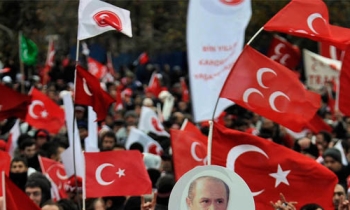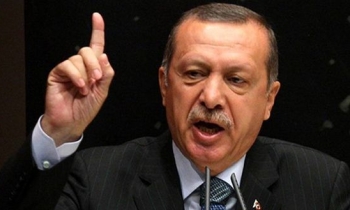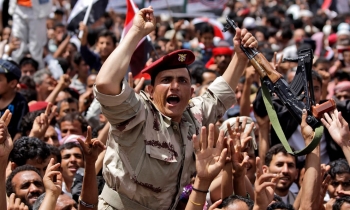BAGHDAD, Iraq - The American journalist Jill Carroll, weeping and veiled, appeared on a new videotape aired yesterday by Al-Jazeera, and the Arab television station said she appealed for the release of all Iraqi women prisoners.
The video was dated Saturday - two days after the American military released five Iraqi women. Ms. Carroll, 28, was crying and wore a conservative Islamic veil as she spoke to the camera, sitting in front of a yellow and black tapestry.
Ms. Carroll, a freelance reporter for the Christian Science Monitor, was seized January 7 by the previously unknown Revenge Brigades, which threatened to kill her unless all women prisoners were released. Al-Jazeera did not report any deadline or threat to kill her yesterday.
An Al-Jazeera editor, Yasser Thabit, said the station received the tape yesterday and that it was between two to three minutes long, but only a fraction of the footage was telecast. In a statement, the Monitor again appealed for her release.
American troops clashed throughout the day with insurgents west of Baghdad. Iraqi police launched a new raid in a Sunni Arab-dominated part of the capital, despite Sunni calls to halt such operations during talks to form a new government.
The clashes west of Baghdad occurred in the capital of the insurgent ridden Anbar province, Ramadi, and began when gunmen fired at least five rocket-propelled grenade rounds and rifles at American Army soldiers. Two insurgents were killed, but there were no American casualties, Marine Captain Jeffrey S. Pool said.
American troops later called in an airstrike against insurgents holed up at the Ramadi sports stadium, raising a column of smoke, residents said. Two civilians were injured when mortar shells exploded near the provincial office building, and one woman was killed by small arms fire, they added.
In Baghdad, Iraqi Interior Ministry commandoes searched the notorious Dora neighborhood, a largely Sunni Arab district and scene of frequent bombings and killings. More than 80 suspects were arrested, including eight Sudanese, four Egyptians, a Tunisian, and Lebanese, according to Major Faleh al-Mohammedawi.
The raid occurred despite calls by Sunni Arab politicians for a halt to such operations as the country's Shiite, Sunni, and Kurdish politicians are discussing formation of a new national unity government, which American officials hope can win the trust of the Sunni Arab community - the backbone of the insurgency.
In the latest attacks, a suicide car bomber slammed into a commando headquarters where police were training in Nasiriyah, about 200 miles southeast of Baghdad, killing one policeman and wounding more than 30, police reported. A roadside blast in western Baghdad killed an Iraqi policeman and wounded another, police said.
In the Kurdish-run city of Sulaimaniyah, the country's health minister, Abdel Mutalib Mohammed, announced the first confirmed case of bird flu in the Middle East. World Health Organization officials said tests showed that a 15-year-old girl who died this month in northern Iraq suffered from the deadly H5N1 strain of the bird flu virus.
Tests were under way to determine if the girl's 50-year-old uncle, who lived in the same house, also died of the virus, officials said. The uncle died last Friday after suffering symptoms similar to bird flu, Iraqi health officials said.
An Italian soldier was slightly injured when an Italian convoy came under attack near Nasiriyah as it was headed to a village to help install electrical power infrastructure, a military statement said. Italy has a 2,600-member military contingent based in Nasiriyah.
A British soldier died of wounds suffered after his patrol came under fire in Maysan province, a British Defense Ministry spokeswoman said.
Later, a roadside bomb exploded near a British patrol in Maysan's provincial capital Amarah, injuring one civilian, Iraqi police said.









